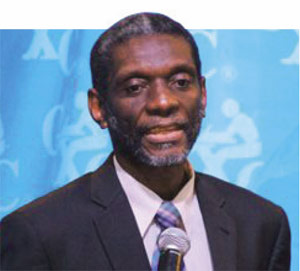![]()
![]()
![]()
For six years, Dr Jules led the innovations from the front. During those years, several innovations were made to marking examination scripts, performance reviews, learners’ support and business development. CXC thanks him for his contribution and wishes him well in his new position. From 2006, CXC has had the pleasure of Professor E. Nigel Harris Chairmanship of the Council. Professor Harris added tremendous value to the organisation during his tenure. He gave his unwavering support to some initiatives, cautious support to others and expressed his disagreement with others. At every stage, however, he acted in the best interest of the organisation and endorsed the desire to make CXC one of the best examining bodies in the world. December 2014 sees the end of the current triennium, and most members of the committees of Council will be replaced with new members and in some cases new Participating Countries. Therefore, as of 2015 CXC will have a new Chairman, new Deputy Chairman, and new committees: Administrative and Finance Committee, Sub-Committee of the School Examinations Committee and Final Awards Committee. Professor Harris and the other professionals who have served gave of their best during their tenure. CXC thanks Professor Harris and all members of the out-going committees immensely and wishes them continued success in their careers and future endeavours. The Council is stronger for their contribution. The successes of 2014 could not have been achieved without the contribution of the Staff. Their commitment, dedication and ability to adapt and innovate have contributed in large measure to the achievements of the 2014 strategic goals. Staff members working with CXC’s many stakeholders have created the New Generation CAPE subjects, completed the electronic marking of 11 papers from seven subjects, and have held more online meetings than in previous years. Both the New Generation of CAPE subjects and the introduction of e-marking signal a major shift in the way CXC does business. The new subjects are a departure from the traditional subjects and place significant emphasis on entrepreneurial endeavours; while e-marking is a major shift in one of CXC’s core processes and is expected to significantly improve efficiency. CXC network of stakeholders from all over the Caribbean: teachers, university and college lecturers, specialists, markers, employers, learners and parents have contributed significantly to its development over the years and 2014 was no different. Many thanks to our stakeholders for their contribution. A book entitled “A History of Caribbean Examinations Council” was launched at the end of 2014. It chronicles the story of the birth and growth of what can be called an ambitious idea at the time – an indigenous examinations board. Professor Patrick Bryan, the author of the book found great joy and satisfaction in researching and compiling this excellent publication. Bringing the book to the stage of publishing involved diverse contributors: current and former Chairmen, Registrars, Pro-Registrars, Committee Members, Staff and other resource persons. To everyone who contributed, CXC says thank you. There is a high level of acceptance of CSEC, the replacement for the O’Levels and CAPE the replacement for the A’Levels. However, there is still some resistance to full regional recognition and acceptance of other qualifications. One such qualification is the CCSLC.
The report also spoke about the potential of the CCSLC programme to contribute to the 21st Century skills of communication and problem solving. UK NARIC’s benchmark of the CCSLC is a major endorsement of the qualification and we look forward to the full recognition of this qualification in due course. As you read through the pages of the 2014 Annual Report, I trust that you will embrace the vision of CXC and get a greater appreciation for the work of the Council, its committees, resource persons and staff. Mr Glenroy Cumberbatch |



 The year 2014 has seen many changes at the Caribbean Examinations Council. Foremost among the changes is the departure of Dr Didacus Jules, the Registrar of this vibrant regional organisation which impacts the lives of every Caribbean family.
The year 2014 has seen many changes at the Caribbean Examinations Council. Foremost among the changes is the departure of Dr Didacus Jules, the Registrar of this vibrant regional organisation which impacts the lives of every Caribbean family. 